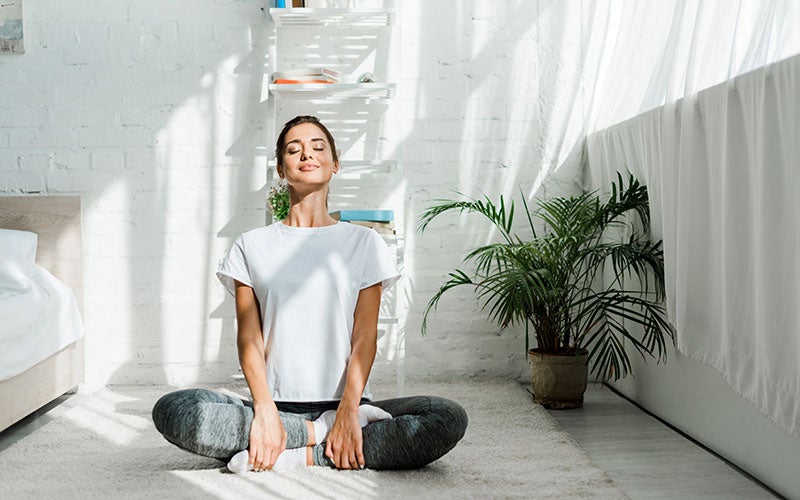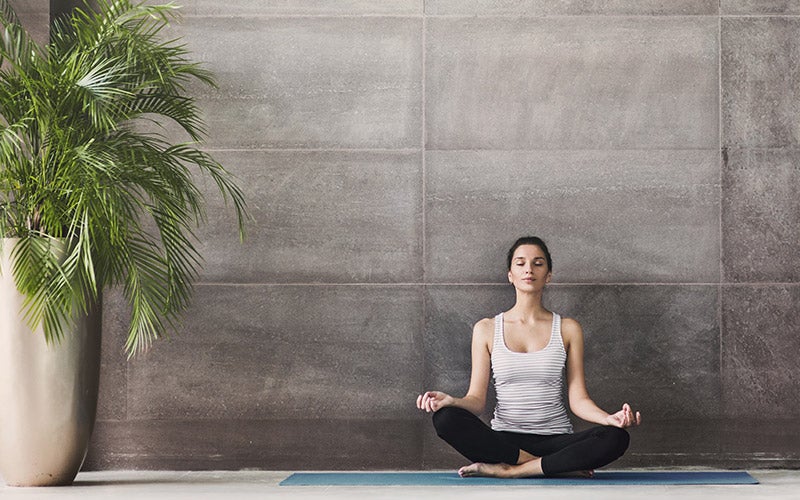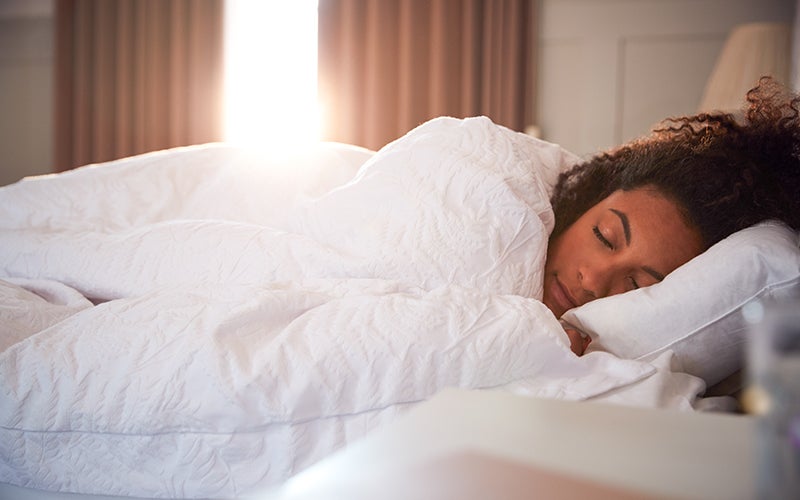How to reduce stress: 9 amazing tips to bring you to a calmer place
 ©LightFieldStudios
©LightFieldStudios
Deadline pressure, emotional strain, physical tension: They all put your body into a state of stress – and, in the long run, that can lead to health problems. That’s why it’s all the more important to balance it out and take time to relax regularly. Read on to find out how to reduce stress right, even in the short term.
Center Yourself By Working up a Sweat
Feeling tense all over and just can’t stop your racing thoughts? To start calming down, you need to clear your head first. Intensive exercise is one tried and true technique for stress management. Try running in the fresh air, a yoga flow session, or a HIIT workout until you find the stress relief strategies and endorphins that are right for you.
Find out more in our article about how exercise reduces stress!
Important: Avoid overtraining your muscles, otherwise your body will continue to release stress hormones that prevent relaxation.

Meditation for Inner Peace
When people feel emotionally stressed, they often ruminate about the past or start imagining future (negative) scenarios. In this situation, mindfulness meditation has proven to be an effective method that can help you deal with stress, counteract the fight or flight response, and even boost your heart health over the long term. You’ll learn to consciously arrive in the here and now and observe your thoughts like imagery instead of spiraling down with them.
Here’s how it works: As soon as you feel your mind going into overdrive, just say “stop.” Take a few deep breaths to benefit from that relaxation response and quiet your thoughts by imagining that you are turning down the volume. You don’t need a special cushion or a yoga guru, but if you’d rather meditate with some structure, there’s tons of meditation products available like apps, podcasts, and online courses.
How to Reduce Stress Through Deep Breathing
Studies show that the breath is one of the most important tools people have for reducing stress and anxiety. It’s also one of the simplest stress relievers, and it has an immediate effect.
Here’s how it works: As soon as the stress response hits, your heart rate goes up, and you want to scream, stop everything and focus on your breath. Notice how the air flows through your nose, down your throat, into your lungs, and out of your body through the same path. Just observe it, don’t judge how fast you’re breathing or try to control it. For more focus, place a hand on your solar plexus and use belly breathing.
Calm Down with Gratitude
Gratitude is one of the simpler relaxation techniques that’s easy to implement right away.
It’s simple: On a particularly stressful day, keep reminding yourself of what you’re grateful for right now. That can be people, something physical, or activities in your life that are important to you. If your stress level stays high, a fixed evening routine of gratitude may help: Before bed, jot down three things you’re grateful for.
Relax by Sticking to Your Decisions
Yes, no, maybe: If you’re constantly vacillating between different options and never commit, it takes a toll on your mental health. Manage stress by practicing taking a clear stand and not going back to question it over and over again.
SOS tip: If a decision is really stressing you out, write down the options and possible outcomes. Put the note next to your bed, and sleep on it for a night. Then pick it up the next morning, make a decision, and stick to it. We tend to be at our most focused in the morning, so take advantage of that and make a decision when it’s easier to do!
Plan Your Stress Away
What am I going to wear today? What will I eat for breakfast? How many calories do I need today? Do I go for a run, go to the gym, or have a rest day? These are questions we could ask ourselves every day, and that constant decision making often leads to feeling overwhelmed. It’s much easier and more relaxing to have a plan. Fixed routines give your everyday life a solid foundation and make it easy to get through the day without having to question yourself or make new decisions.
One way to do it: Always get up at the same time, enter your training days in a calendar, and plan your meals for the week on Sunday. A well-structured training plan or a nutrition plan can also help lower your stress levels, because you’ve made all the important decisions in advance.
Nature Against Stress and Anxiety
Stressed out? Then get out into the fresh air right away! Research suggests just 20 minutes in nature can provide significant stress relief and boost your immune system. Cortisol levels can drop by up to 20 percent during this time.

Easy as 1-2-3: Doesn’t matter whether you go for a walk, a hike, do some progressive muscle relaxation, or just lie down in the garden and watch the clouds – nature is guaranteed to help you feel good, and maybe even lower your blood pressure.
Stress Relief in Your Sleep
Intuitively we know how important a good night’s sleep is for good health. People who don’t sleep well usually cannot focus as well, have more frequent food cravings, and are more likely to suffer from headaches – to name just a few side effects. So if more inner peace is your goal, pay attention to your sleep quality!
Check out our 8 tips for a good night’s sleep here.

SOS tip: A power nap can also work wonders as a stress reliever. If it’s hard for you to sleep in the middle of the day, try a short meditation or breathing exercise instead.
Relax Through Your Diet
The old saying “You are what you eat” still rings true, even when it comes to your mood. Tweaking your diet a bit can help you calm down because, just like certain foods are definitely stimulants, others can help you relax.
The most important guidelines: Avoid alcohol and caffeine as much as possible, especially before bedtime. Go for calming herbal teas instead, like those with lemon balm, chamomile, and lavender.
Other foods that are also stress relief tools include walnuts with honey, dark chocolate, oatmeal, cashews, and green vegetables like bok choy, endive, spinach, and broccoli. They contain essential vitamins and the amino acid tryptophan, a building block for serotonin and melatonin, also known as the happiness and sleep hormones.
Want to cover your basic nutritional needs as quickly as possible? Our Daily Vitamins provide you with the right dose every day – to improve your physical health and lower stress.
Check out Our Daily Vitamins here
Conclusion
- Emotional and physical stress are part of everyday life and are nothing to worry about if they just come up from time to time. Chronic stress, however, can be detrimental to your physical and mental health in the long term.
- It’s important for both your body and mind to relax and de-stress regularly.
- There are many ways to find inner peace in a stressful daily routine.
- Effective ways to relax include: exercise, meditation, gratitude and breathing exercises, fixed routines, time in nature, enough quality sleep, and a balanced diet.
Sources for this article
We at foodspring use only high-quality sources, including peer-reviewed studies, to support the facts within our articles. Read our editorial policy to learn more about how we fact-check and keep our content accurate, reliable, and trustworthy.


































